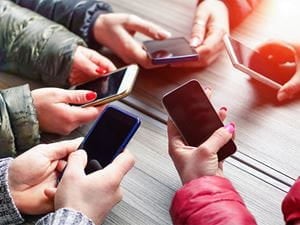
Have you ever gazed into the darkened camera of your phone or laptop, wondering if anything is looking back?
Something probably is. But it’s not the stereotypical hooded hacker in the Guy Fawkes mask you’re thinking of right now. It’s much more likely to be your own government. But through the holes this governmental surveillance passes through, those hackers may soon follow.
President Donald Trump has made headlines of late after claiming that he was wiretapped by President Barack Obama in 2016, and while White House counselor Kellyanne Conway’s subsequent comments about microwaves that turn into cameras may not be verifiable, there are plenty of other devices that most definitely can—and do—spy on us.
The Era of Smart Devices
Ours is an age of connectivity. An “internet of things”—also known as the IoT—is arising in the form of an ever-growing network of physical devices, appliances, and vehicles that are able to connect to the internet. This network adds value to our lives—what if your alarm clock, for example, could trigger your coffee maker to make you a fresh cup of joe? What if your watch could periodically send your vitals to your primary care provider in order to catch disease before it truly starts? The IoT allows for endless opportunities for innovation and improvements, and we’re only just beginning to understand how we can make use of this newest level of interconnectivity.
We are also, however, only beginning to understand the risks that come with a fully networked world. When someone can hack not only your computer, but also your toaster, shower, and car, an entirely new level of danger comes into being.
One of those dangers is surveillance. Everything that’s equipped with a camera or a microphone can be hacked into and used to record you. This includes more devices than you think—Researchers at Israel’s Ben Gurion University have demonstrated that it is possible to hack into a device and use its speakers to record audio, even when microphones have been removed or disabled. They did this by devising malware that causes speakers work in reverse, capturing sound vibrations in the air rather than creating them.
Suddenly, Conway’s remark about microwaves seems a little less farfetched.
Big Brother is the Biggest Offender
In 2013, an National Security Agency contractor named Edward Snowden obtained and leaked thousands of classified NSA documents to the public after fleeing the U.S. The information he revealed painted the picture of an America that spied on not only its enemies, but its allies and its people, in far more intrusive ways than anyone had suspected.
Whether you consider Snowden a hero or a traitor, his revelations created much-needed conversations regarding mass surveillance and privacy issues that are still reshaping policy years later.
These revelations included the fact that nearly every telephone company in America had been providing the NSA with all of their customers’ phone records. Also uncovered was the fact that the NSA could infiltrate links connecting Google and Yahoo data centers, all without the knowledge of anyone in either company. Even more damning was the revelation that American spies were eavesdropping on over 122 world leaders, many of them allies.
But that’s only the beginning. The latest release from WikiLeaks details how the CIA has been developing tools to hack a variety of the “things” in the internet of things.
The report alleges that the CIA can hack smartphones—phones like your iPhone or Android—and listen or watch you. Even more disconcerting is the idea that the government can hack other things, namely internet-connected televisions, which can be remotely placed into a false “off” position so that, while they may appear inert, they are still recording.
These government-sponsored hacks can effect anything that connects to the internet and has either a camera, a microphone, or a speaker—in the coming years, that’s going to be just about everything in “smart” homes. The internet of things has given the government to keep an eye on us, and they’ve proven themselves very good at taking advantage of such opportunities thus far.
Why You Should Care
Many will read the allegations brought to light by Snowden and WikiLeaks and feel that the loss of privacy is worth the security of the nation. In some ways, it is—there will always be a need to balance security and privacy, especially in times of conflict. This is inescapable, at least for now.
But there are other dangers here. When the government creates a digital tool that can allow them access to your devices, they can leave you vulnerable to those who have intentions other than mere surveillance.
This is because when a government agency discovers a hole in a device’s security, they keep it to themselves. They don’t share it with the corporations that create these devices. And because of this, “any hacker can use the security hole the CIA or NSA has left open…” tweets Snowden.
Instead of working with tech companies to establish safe modes of surveillance, government agencies hoard secret vulnerabilities for themselves, putting us all at greater risk from hackers of every sort.
And beyond issues of technological risk, there is the simple fact that privacy is psychologically important. It is only when we’re alone—and when we know we are alone—that we can develop our identities outside of normal social restrictions. A lack of privacy interferes with our thinking, our behavior, and our decisions. It pushes us away from who we really are, and into being people we that we think those who watch us will approve of.
These reasons are why the conversation about privacy matters.
Privacy Matters
If these concerns resonate with you, it’s time to act. Yes—you can begin to protect yourself by installing appropriate antivirus software, changing passwords often, keeping your software updated, unplugging devices when not in use, and even physically covering or removing cameras and microphones, but these things are only a temporary fix.
To fix the issue at the heart of this problem will take legislation. It will take a change in how the government works, in how transparent they are when working with corporations in order to put their security measures into practice. In this way, your power to vote is the single biggest step you can take in protecting your privacy and safety in an increasingly networked world.
Don’t waste it.

